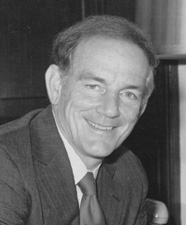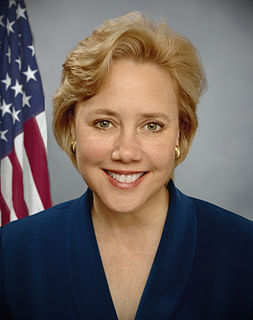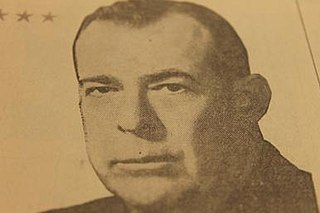Legal and political life
In 1957, Toledano was licensed to practice law in Louisiana. In 1967, he was the second partner in Porteous, Toledano, Hainkel, and Johnson, then the second oldest law firm in Louisiana specializing throughout its history in insurance defense. Law partner John Hainkel, a Democrat-turned-Republican, was later the only man until 2012 to have served as both Speaker of the Louisiana House of Representatives and President of the Louisiana State Senate. [1]
Originally a Democrat, Toledano in 1960 joined the Louisiana States' Rights Party, a conservative, segregationist group which offered electors separate from the national Republican and Democratic presidential nominees, Richard M. Nixon and John F. Kennedy. Though Kennedy won the electoral votes of Louisiana, the combined Nixon and States Rights slates represented a majority of the ballots. [2]
Thereafter, Toledano became a Republican and ran for mayor of his home city in the general election held on March 1, 1970. Toledano is descended from Louis XIV of France and Spanish and French colonists. [3] His mother, the former Beeyce Casanas (1908-1991), [4] was Queen of Rex in 1929. However, many in the upper class refused to support Toledano in the mayoral campaign against the Democratic nominee Moon Landrieu, a former protégé of the late Mayor deLesseps Story Morrison and the father of U.S. Senator Mary Landrieu and former New Orleans Mayor Mitch Landrieu. Toledano said that members of the upper class often told him that they favored Landrieu because they believed the Democrat could deal better with African American relations than would Toledano. [3]
Toledano polled 65,558 votes (41 percent), mostly from lower- and middle-class whites; Landrieu, with nearly all of the black vote behind him, prevailed with 94,332 votes (59 percent). Earlier, On December 13, 1969, Landrieu had defeated fellow Democrat Jimmy Fitzmorris, a more conservative candidate and subsequently the Louisiana lieutenant governor, in the runoff election, 89,554 (53.9 percent) to 76,726 (46.1 percent). Even though several Fitzmorris managers switched allegiance to Toledano, who campaigned vigorously for a Republican in a Democratic stronghold, Landrieu defeated Toledano by a larger margin than he had bested Fitzmorris. [2]
Two years later, Toledano replaced Charles M. McLean of Lafayette as the GOP nominee for the U. S. Senate seat vacated by Allen J. Ellender, who died while campaigning for a seventh term in office. Bennett Johnston, a former member of the Louisiana State Senate from Shreveport and an unsuccessful gubernatorial candidate in 1971, defeated both Toledano and two other candidates, former Governor John McKeithen, who ran as an Independent because the filing process was not reopened upon Ellender's death, and Hall Lyons of Lafayette, the younger son of Republican pioneer Charlton Lyons of Shreveport, who had lost the 1964 gubernatorial election to McKeithen. Hall Lyons ran on George Wallace's former American Party. As expected, Johnston finished with 598,987 votes (55.2 percent) percent of the vote against his three opponents. McKeithen ran second with 250,161 (23.1 percent); Toledano third with 206,846 (19.1 percent), and Lyons with 28,910 (2.7 percent). [2] The Nixon administration refused to support the Republican senatorial nominees running against incumbent Democrats in the South who had supported the Vietnam War. This decision after the Watergate break-in. Shunned by the White House along with Toledano, who was not running against an incumbent, were Gil Carmichael in Mississippi, Winton Blount in Alabama, and Wayne H. Babbitt in Arkansas, out of deference to Senators James Eastland, John Sparkman, and John Little McClellan, respectively. [5]
Coincidentally, Toledano was the only Republican U.S. Senate nominee in Louisiana between 1962 and 1984. The 1984 candidate, Robert Max Ross (1933-2009) of Richland Parish, carried no party organizational support. In 1986, however, the state GOP coalesced around then U.S. Representative Henson Moore of Louisiana's 6th congressional district, who waged a strong but losing race against the Democrat John Breaux to succeed veteran retiring Senator Russell B. Long.
Ten years after Toledano's Senate campaign, President Ronald W. Reagan in 1982 strongly and publicly proposed the nomination of Toledano to a vacancy on the United States Court of Appeals for the Fifth Circuit to succeed Robert Andrew Ainsworth, Jr., who died the preceding year. Toledano carried the recommendation of the state party leadership, including then Governor David C. Treen, but the National Association for the Advancement of Colored People and a local group of African-American attorneys opposed his selection. They cited Toledano's involvement in 1960 with the Louisiana States' Rights Party, but Treen himself had been a part of that temporary party, along with Democrats Leander Perez, Jared Y. Sanders, Jr., and William M. Rainach. In December 1982, Fred Fielding, Reagan's counsel, in a memorandum to the joint White House-Justice Department working group, said that Toledano was "a well-qualified candidate ... However, we believe the facts described below should be brought to your personal attention before further action occurs on the part of this prospective nominee." The memo described Toledano's past ties to the States Rights Party and the opposition from a committee of the American Bar Association. Several days later, the White House informed Toledano that his nomination had been withdrawn. Evidence shows that Reagan himself personally made the decision. [6] Reagan instead named W. Eugene Davis of Lafayette to the appeals court seat. [7]
Personal and literary life
Toledano is married to the former Roulhac Bunkley, a native Texan with a French Huguenot first name. Their children are son, Macon Cheek Toledano (born 1965), and daughters Gabrielle B. Toledano (born 1967), Roulhac d'Arby Toledano (born c. 1969), and Cleanth Brooks Toledano (born c. 1975), [8] who is named for the literary figure Cleanth Brooks. It was in the Toledano home in New Orleans in the early 1960s where Brooks met Walker Percy, and Brooks frequently visited with Toledano when he was in town. [5]
In 1983, after the failure of the Reagan administration to pursue Toledano's appointment to the federal bench, Toledano moved his family to Charlottesville, Virginia. There they renovated into an elegant 10-room home of distinct southern culture a three-story warehouse, priced at $200,000. The warehouse was built in 1914 for a wholesale grocer and later used by the former Chesapeake and Ohio Railway. Mrs. Toledano operated an antiques shop on the bottom floor of the building and is a published author on topics relating primarily to art. The Toledanos resided in the Charlottesville house for eight years. A devotee of classic books, Toledano customarily bought five copies of each classic, one for Roulhac and himself and one for each of their children. He particularly stressed Southern Agrarians and such classicists as Walker Percy, Eudora Welty, and Cleanth Brooks. [9]
Toledano formerly wrote for The Wall Street Journal , Texas Monthly , William F. Buckley, Jr.'s National Review , and Thomas Fleming's Chronicles , a "paleoconservative" magazine published in Rockford, Illinois. Paleoconservative views are represented by such individuals as the defeated three-time presidential candidate Patrick J. Buchanan or the late columnist Samuel T. Francis. They contend that "neoconservatives" in national Republican administrations of the two Presidents Bush in particular have betrayed traditional Republican values to keep the United States involved in endless wars in the name of "democracy" and international trade agreements which cause the movement of jobs outside the United States. [2]
In 1991, Toledano was admitted to the practice of law in Mississippi. [10] Since moving to Mississippi, he has lived in Pass Christian in Harrison County on the Mississippi Gulf Coast, but he spends time too in Columbus in Lowndes County in eastern Mississippi, where he writes columns for The Dispatch newspaper, which also covers Starkville, Mississippi. [11]
One of his most controversial columns was carried in 2007 in Commentary magazine; "New Orleans -- An Autopsy", is a lengthy examination of the long-range political implications of Hurricane Katrina. Toledano concludes that New Orleans was in rampant social decay for a generation before the storm struck so severely in August 2005 and less to a mass exodus of mostly poorer residents. He considers the decay to have been insurmountable since the early 1970s, the time of his failed political campaigns. He declared the two-term Landrieu administration a political and economic failure and added that he is unsure if he, following a different philosophical bent, could have succeeded as mayor as well, considering the social decay. [12]
Toledano's has deposited some of his family and personal papers in the Special Collections and Archives Department of the J. Edgar & Louise S. Monroe Library at Loyola University New Orleans. [13]









